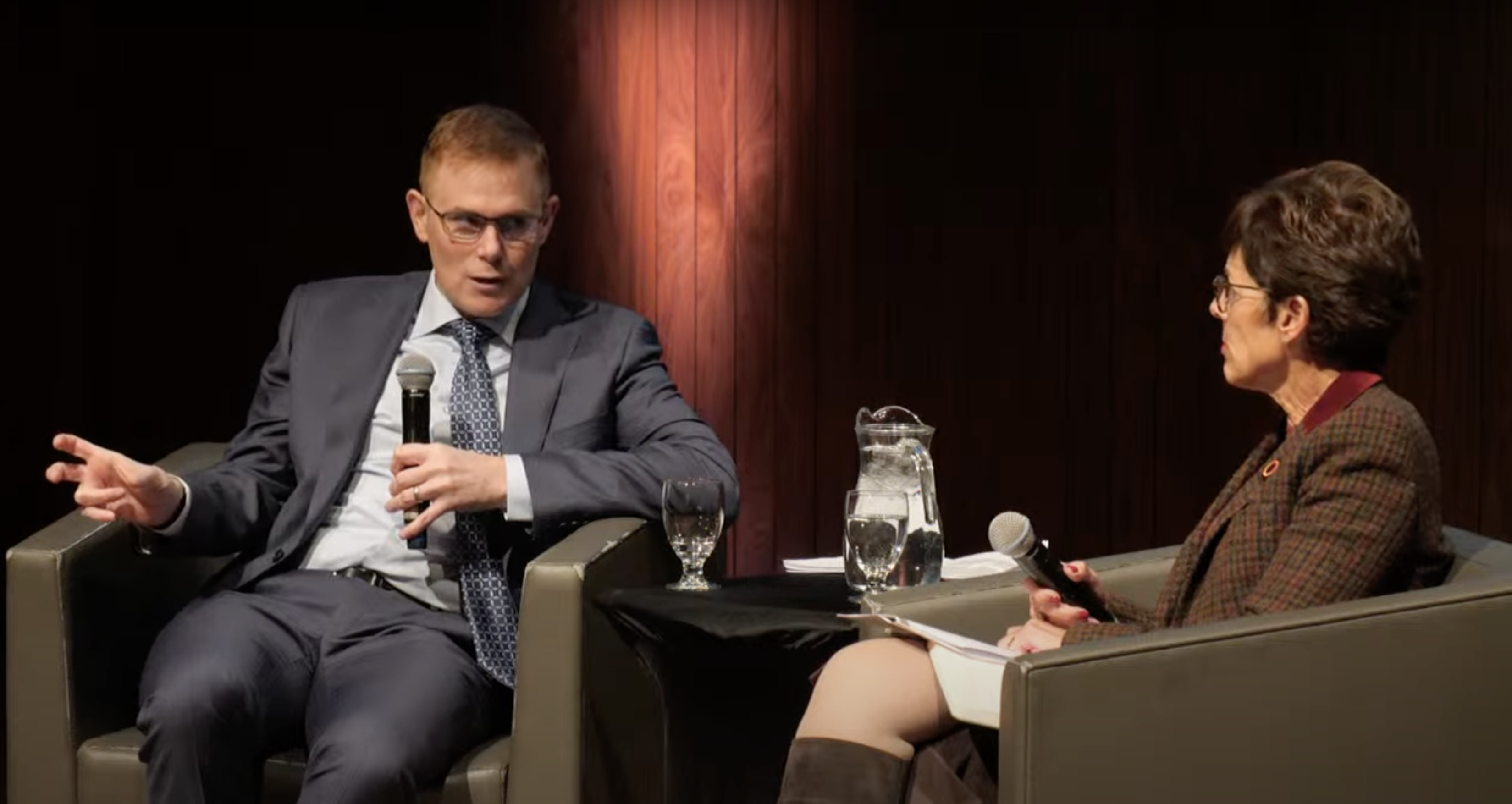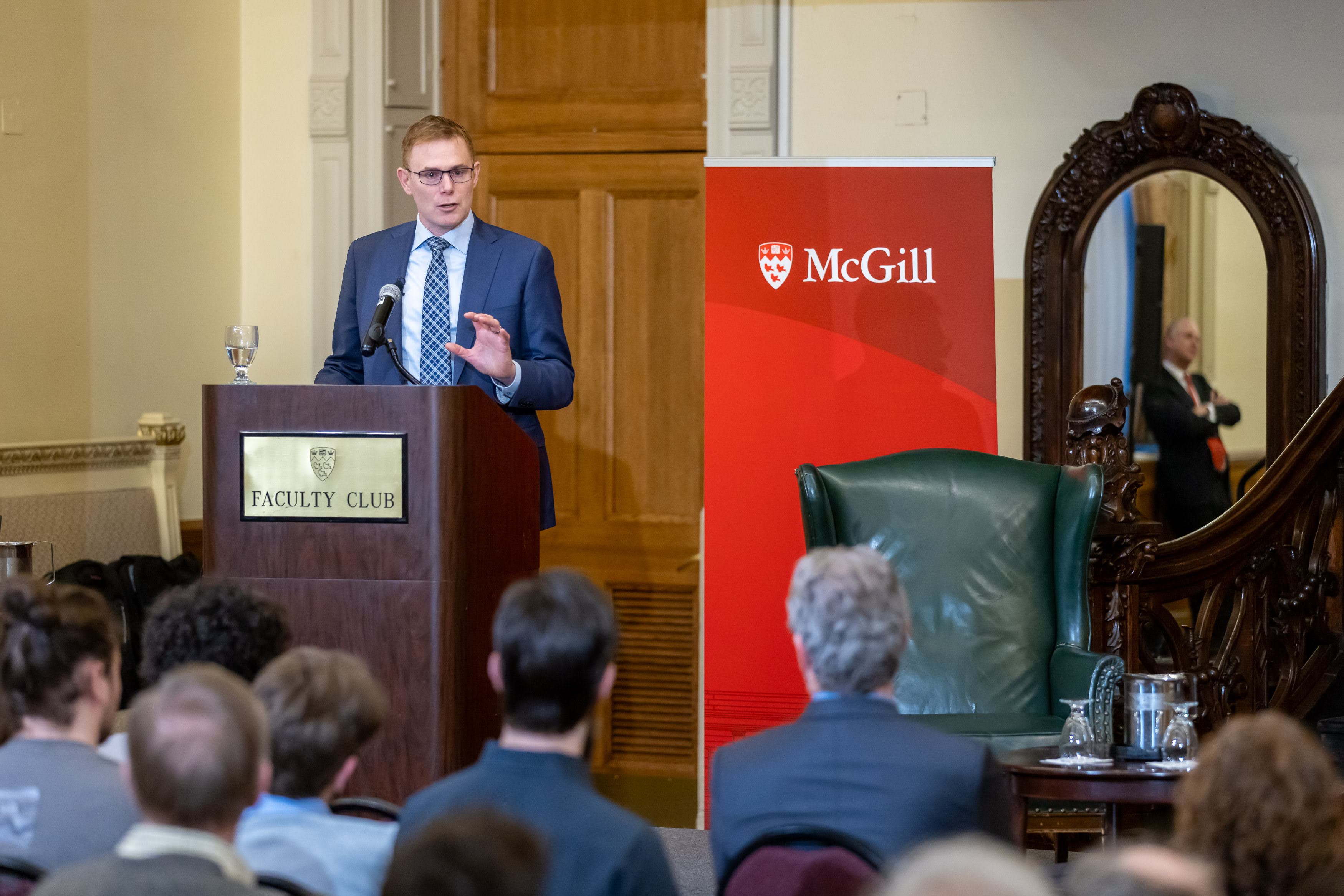Canada needs better policies to address today’s economic challenges, and that starts with bold discourse. The McGill Max Bell Lectures kicked off this fall with a focus on addressing Canada's economic challenges related to addressing climate change. The lectures were held in three Canadian cities—Ottawa, Calgary, and Montréal. Throughout the lectures, there was a distinct sentiment that discussions on climate change may have yet to reach their utmost potential for meaningful progress.
For each lecture, Andrew Leach discussed different chapters from his book, "Between Doom & Denial: Facing Facts about Climate Change." Renowned for his expertise in energy and environmental economics, Professor Leach holds a joint appointment in the Department of Economics and the Faculty of Law at the University of Alberta. Leach advocates for honest conversations and practical policies to navigate Canada's ongoing energy transition. The 2023 lectures aimed to foster open dialogue about practical policies to drive Canada’s energy transition. Leach's comprehensive research addresses six climate change myths, offering a thought-provoking exploration that confronts and challenges misconceptions.
“Aggressive Canadian policies can make an important difference, and if they are designed appropriately, they do not need to threaten Canada’s economic prosperity,” said Christopher Ragan, Max Bell’s director, who spearheaded the series. Below were the key discussions from Leach’s book.
Can governments promise a just energy transition in Canada?
At the National Arts Centre in Ottawa, Leach and Heather Scoffield from the Business Council of Canada discussed Canada's complex climate issues, focusing on the oft-heard notion of a "just transition." Leach cautioned against oversimplifying the shift away from oil and gas, drawing from Alberta's experiences and emphasizing the challenges for workers and communities. He highlighted the government's limitations in ensuring a smooth transition and advocated for more realistic conversations and support systems for affected groups.
Leach and Scoffield explored the evolution of the "just transition" term from hopeful to contentious, especially in energy-affected areas. The discussion widened to consider oil and gas companies' potential shifts to clean energy and the intricate dynamics of investment, labour, and productivity. They debunked climate change myths, emphasizing the difference between sustained warming and individual warm years. “The world isn’t affected by a single warmer-than-average year in Canada, but the world is going to be dramatically affected by Climate Change,” Leach said. He cautioned against narratives of imminent doom without emission cuts or dismissive attitudes, advocating for a pragmatic approach to tackle these challenges.
Watch Andrew Leach in conversation with Heather Scoffield in Ottawa.
Will the world use enough of our oil and gas?
The next lecture was held at Calgary’s Studio Bell, where Leach explored the connection between oil and gas industry growth projections and climate change mitigation. Leach revealed industry omissions and half-truths, which highlighted concealed realities behind their projections. In a discussion with Deborah Yedlin from the Calgary Chamber of Commerce, he emphasized threats to the industry's future and the need for government policies that balance economic progress without stifling it.
They discussed Canada's impact on climate change, emphasizing that Canada accounts for only 2% of global emissions. Leach highlighted the mathematical reality and cautioned that stringent carbon policies in Canada alone won't solve global climate issues. He advocated for nuanced policy discussions rather than solely focusing on percentage targets.
Leach stressed the need to invest in new technology and infrastructure for transitioning to renewable energy like solar and wind. He emphasized: “The problem isn’t that solar and wind are expensive, it’s the lack of low capital cost dispatchable technology.” The conversation highlighted the complexity of balancing environmental concerns, economic implications, and international commitments in Canada's energy policy landscape.
Watch Andrew Leach in conversation with Deborah Yedlin in Calgary.
Do Canada’s cold temperatures mean we shouldn’t worry about climate change?
In the final lecture at McGill's Faculty Club in Montreal, Leach and Gerald Butts from the Eurasia Group discussed Canada's stance on climate change. Leach highlighted the misconception that Canada might benefit from warmer winters, stressing the broader impacts like increased smoke, melting permafrost, rising sea levels, intensified storms, and global instability. He stressed that while adaptation is possible, relying solely on it is an inadequate response; he stated that mitigation must play a crucial role in addressing global climate change.
The conversation revisited discussions from the post-Trudeau 2015 election, highlighting the push for improved climate policy. Leach noted Alberta's transformation and stressed carbon pricing's significance, urging continuous support. “It can’t be something that we did 5 years ago, and now we’re doing other things,” said Leach. He emphasized the need for sustained focus, stating that carbon pricing must remain a pivotal policy rather than a past initiative, crucial for Canada's climate change mitigation efforts.
Watch Andrew Leach in conversation with Gerald Butts in Montréal.
The McGill Max Bell Lecture Series serves as a platform to address Canada's pressing economic challenges. Throughout the 2023 series, myths were dispelled, industry projections were scrutinized, and Canada's limited global emissions impact was highlighted. Leach emphasized the imperative for balanced policies, technological investment in renewables, and sustained emphasis on carbon pricing for effective mitigation. This commitment to critical analysis, balance, and practicality aligns with the overall mission of the McGill Max Bell Lectures, annually engaging in discussions for a prosperous future.






